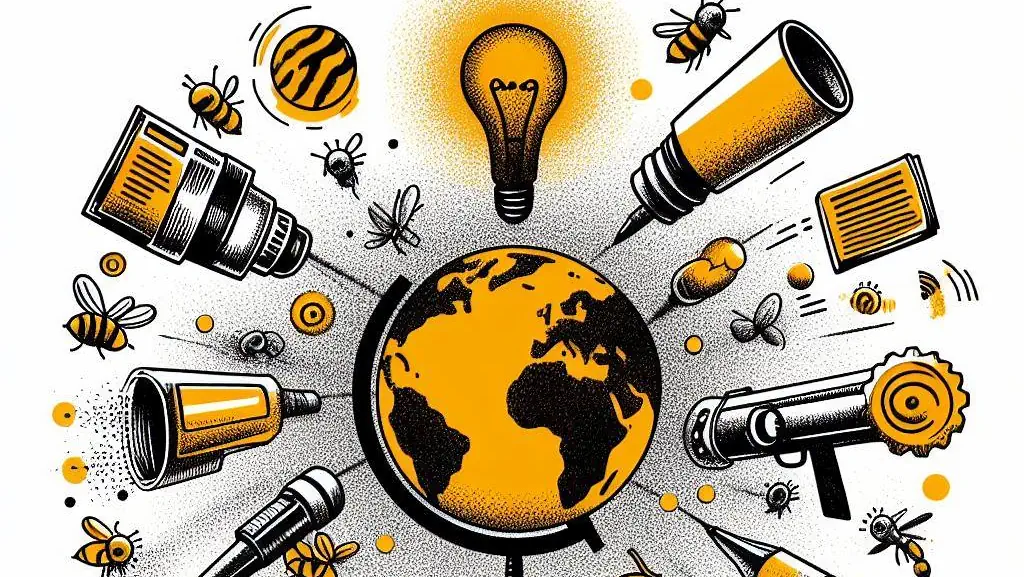 illustration: bing.com/create
illustration: bing.com/createOne of the most critical short-term threats highlighted by global risk experts, policymakers, and leaders from various industries is disinformation. It can be used to manipulate public opinion and undermine democracy. With the development of artificial intelligence technology, disinformation is becoming increasingly realistic and difficult to distinguish from the truth. This could lead to greater social polarization, unrest, and even violence.
The primary concern is AI-based disinformation. AI gives creators of false information new, powerful, and unprecedented tools to fuel conflicts and polarize entire societies. According to the report’s authors, false information combined with social unrest will be in the spotlight due to upcoming elections in several major world economies.
- In recent years, we’ve witnessed incredible technological advancements, mainly with artificial intelligence, which supports progress in many areas of our lives and industries, such as medicine and pharmaceuticals. But this development also brings risks, including cyber threats - comments Artur Grześkowiak, CEO of McLennan in Poland and the CEE Region, in an interview with Newseria Biznes. - Moreover, as noted in the "Global Risks Report," the development of technology and AI may also increase the scale of disinformation and disruptions in information access.
The growing popularity of AI and related cyber threats is having a positive impact on the cyber insurance market, which is already experiencing dynamic growth.
- The use of artificial intelligence presents both opportunities and threats. It can support cybersecurity, but on the other hand, if it falls into the hands of hackers, it can also pose a serious threat - emphasizes Małgorzata Splett, FINPRO & Cyber Leader in the Central and Eastern Europe Region, in an interview with Newseria Biznes. - The widespread use of AI in business will only increase demand for such insurance. Additionally, more competitive pricing and extended coverage options offered by insurers will further support its popularity.
This year’s "Global Risks Report" also points to the rising threat of armed conflicts – experts see it as one of the top five issues over the next two years, and current geopolitical tensions are expected to cause further conflict spread. About two-thirds of global experts predict that within the next decade, a multipolar, fragmented world order will emerge, with medium and major powers competing, setting, and enforcing new rules and norms.
The "Global Risks Report" is prepared by the World Economic Forum in collaboration with Marsh McLennan and Zurich Insurance Group. It analyzes the most serious challenges that may arise over the next decade in the context of rapid technological changes, economic uncertainty, demographics, conflicts, and climate change.
COMMERCIAL BREAK
New articles in section Media industry
Tags, hashtags and links in video descriptions. Youtube SEO after Gemini AI update [ANALYSIS]
BARD
Once, positioning a video on Youtube was simple. It was enough to stuff the description with keywords and wait for results. Those days are not coming back. In 2026, the algorithm is no longer a simple search engine that connects dots. It is the powerful Gemini AI artificial intelligence that understands your video better than you do.
Freelancers 2025 in media and advertising. Useme report
Krzysztof Fiedorek
The modern media and communication market presents entirely new challenges for independent creators. Traditional services are giving way to more complex forms of messaging. The most popular industries in which Polish freelancers operate focus on companies' online presence and visual content.
Video content in Poland. What and how we watch
Paweł Sobczak
Video content is watched remotely, but streaming services are mainly enjoyed in the comfort of home. This is how the consumption of audiovisual content by Poles in 2025 can be summarized. This is the result of an analysis of a study conducted by SW Research and data from the company MEGOGO.
See articles on a similar topic:
Dead internet theory is a fact. Bots now outnumber people online
Krzysztof Fiedorek
Already 51% of global internet traffic is generated by bots, not people. As many as two-thirds of accounts on X are likely bots, and on review platforms, three out of ten reviews weren't written by a human. Do you feel something is off online? It's not paranoia. In 2025, it's a reality.
New Individual Mass Media (Mass Self Communication)
Grzegorz D. Stunża
In the latest issue of "Le Monde Diplomatique," there’s an article by Manuel Castells titled "Individual Mass Media." The author points out that media, once subjective and often party-affiliated (as with newspapers), only briefly moved away from one-sidedness when under various pressures.
Journalism and Technology. How Indian Newspapers Fight to Survive
KFi
The COVID-19 pandemic accelerated the transformation of India's press industry. Traditional print media, forced to fight for survival, adopted modern technologies ranging from data analysis to artificial intelligence. How do journalists adapt to new roles, and how do media redefine their future in the digital age? Researchers from the Symbiosis Institute of Media & Communication have explored these questions.
Global Media Under Scrutiny. Reuters Institute Digital News Report 2024
Krzysztof Fiedorek
The “Digital News Report 2024,” developed by the Reuters Institute for the Study of Journalism, describes the landscape of digital news media based on data from 47 markets, representing more than half of the world’s population.





























